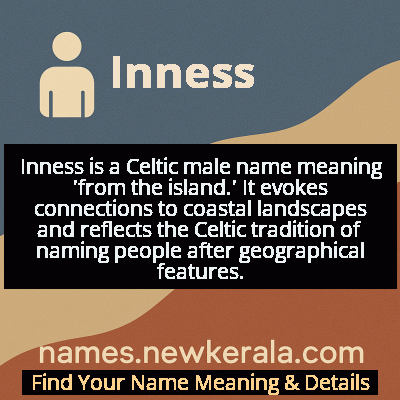Inness Name Meaning & Details
Origin, Popularity, Numerology Analysis & Name Meaning of Inness
Discover the origin, meaning, and cultural significance of the name INNESS. Delve into its historical roots and explore the lasting impact it has had on communities and traditions.
Name
Inness
Gender
Male
Origin
Celtic
Lucky Number
8
Meaning of the Name - Inness
Inness is a Celtic male name meaning 'from the island.' It evokes connections to coastal landscapes and reflects the Celtic tradition of naming people after geographical features.
Inness - Complete Numerology Analysis
Your Numerology Number
Based on Pythagorean Numerology System
Ruling Planet
Saturn
Positive Nature
Ambitious, efficient, realistic, and authoritative.
Negative Traits
Materialistic, stressed, confrontational, and can be overly ambitious.
Lucky Colours
Dark blue, black.
Lucky Days
Saturday.
Lucky Stones
Blue sapphire, amethyst.
Harmony Numbers
2, 4, 6.
Best Suited Professions
Business leaders, managers, financial services, law enforcement.
What People Like About You
Leadership, determination, organizational skills.
Famous People Named Inness
George Inness
Painter
Prominent American landscape painter and influential figure in the Tonalism movement
George Inness Jr.
Painter
American painter who followed in his father's footsteps, known for landscape and animal paintings
Inness Ironside
Military Officer
British Army officer and colonial administrator in Africa
Name Variations & International Equivalents
Click on blue names to explore their detailed meanings. Gray names with will be available soon.
Cultural & Historical Significance
Historically, the name appears in Scottish clan history through the Innes clan of Moray, who held lands in northeast Scotland since the 12th century. The name's transition from surname to given name represents a modern trend of repurposing traditional Celtic surnames as first names, preserving cultural heritage while adapting to contemporary naming practices. This evolution demonstrates how Celtic names maintain their cultural relevance while adapting to modern usage patterns.
Extended Personality Analysis
Individuals named Inness are often perceived as possessing a strong connection to nature and a contemplative disposition, reflecting the name's island origins. They tend to be independent thinkers who value their personal space and autonomy, much like an island standing separate yet connected to the mainland. This independence is often balanced with a deep sense of loyalty to their chosen communities and a capacity for introspection that allows them to navigate complex emotional landscapes with wisdom and patience.
Their personality typically combines practical resilience with creative insight, enabling them to approach challenges from unique perspectives. While they may appear reserved initially, those named Inness often reveal profound emotional depth and steadfast reliability once trust is established. They embody the Celtic ideal of strength through connection to one's roots while maintaining the flexibility to adapt to changing circumstances, making them both grounded and innovative in their approach to life's challenges.
Modern Usage & Popularity
Inness remains a relatively uncommon given name in modern times, primarily used by families with Scottish or Irish heritage seeking to honor their ancestral roots. While it hasn't appeared on mainstream popularity charts, it has seen a slight increase in usage as part of the broader trend of reviving Celtic names and using surnames as first names. The name is particularly favored by parents looking for a distinctive yet historically grounded name that connects their child to Celtic traditions without being overly common. Its usage is most concentrated in Scotland, Ireland, and among diaspora communities in North America and Australia.
Symbolic & Spiritual Meanings
Symbolically, Inness represents the concept of the individual as both separate and connected—much like an island in relation to the mainland. It embodies the Celtic spiritual understanding of sacred spaces and thresholds, where islands often served as places of transformation and enlightenment. The name carries connotations of resilience, self-sufficiency, and the ability to maintain one's identity while remaining part of a larger community. It suggests a person who can stand firm in their convictions while still engaging meaningfully with the world around them, representing the balance between solitude and community that characterizes human experience.

